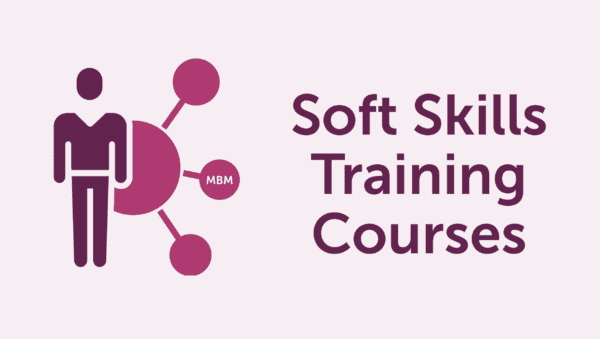Soft Skills in The Workplace
Ah, soft skills! Those skills we love to claim to have but hate to spend time developing. Here we will explore a number of aspects concerning soft skills and their real importance.
Soft skills are essential traits that anyone needs. We use them to effectively interact with others. These wide ranges of skills cover anything from communication to teamwork to negotiating and more.
In this article we will look at:
- What are soft skills?
- What are examples of soft skills?
- Why are they important?
- Who needs soft skills development?
- How can these skills be enhanced for better results?
What are Soft Skills?
The main concept about soft skills is that they are necessary personal attributes that allow people to better interact with others. We use them every day, in both our work and personal interactions. These skills are considered a key component to company and individual success in any industry. Consider your workplace.
Imagine the day passing without any staff interaction. Or imagine still the impact a negative interaction has on you. While hard skills or technical skills can be easily taught and measured, soft skills can be harder to learn and evaluate. These skills are however transferrable across roles and even industries, unlike many technical skills.
Nowadays, most companies will look for certain soft skills competencies during the recruitment stage. This will usually be done by giving the applicant a scenario and seeing how they respond, showing their understanding and use of different skills.

Examples of Such Skills
Many sources will list their top 5 soft skills, their top 10 choices or examples, etc. Here we will give you examples of the most common soft skills that employers look for when recruiting new hires to their team. We will also give brief explanations of each for better understanding. Remember, the range or list of these skills is quite significant. Also, these skills then all have sub-skills that can be broken down and developed. These sub-skills can then appear in multiple soft skills, depending on their use. Let’s look at the selection that commonly appears during the advertising and interviewing for a new position.
Teamwork
No matter how small or large your company is, teamwork is essential for success. While some within your team will have natural abilities to work well with others, some may need help in this area. Therefore, developing teamwork abilities will be a good investment of time and effort on behalf of any company. Think about the team projects you have in place. Then, consider the skills that would make these projects work more effectively. Also, decide on the team dynamic that would work best for topic of the project at hand.
Within the topic of teamwork, focus on attributes such as collaboration, interpersonal skills, active listening, and delegating work. Be sure to give group activities for this particular skill set!

Communication
Here we can look at skills for both written and verbal communication. Use individual and group activities to practice these skills. Give focus to traits such as public speaking, negotiating, confidence, empathy, and active listening.
All roles within a company will require different forms of communication in order to achieve success. Therefore, develop communication skills as an important within your industry for success. Practice areas such as providing feedback, conducting interviews and appraisals, and retention of information in this section.
Problem Solving
Within many roles in your company, problem-solving, and decision-making will be of great importance. These are not just limited to leadership roles.
Conduct different activities that allow staff to practice problem-solving. One activity for improving problem-solving, conduct a SWOT analysis. Use it to identify reasons for problems the company or team is facing. Another way, use the fishbone diagram activity to source root problems. Next, brainstorm solutions to problems. Then, analyse the effectiveness of the different options. Finally, apply the problem-solving solutions in real-life scenarios.
Change Management and Adaptability
Being able to adapt and manage change can be critical in teams going through personnel transitions, policy changes, or mergers. Also, they are needed during the introduction of new policies, procedures, systems, and technology. Not everyone is ready for change, and they can react quite badly to it.
For example, address flexibility when covering change management and adaptability. Use activities that show how people can cope with change and adapt to different situations. Show benefits of the change and the positive results that are expected. Also, introduce coping mechanisms for those struggling with the change.
Time Management
We could all use more time. And in business, time is critical in terms of deadlines and customer needs. This can be in projects, product rollout, or guest experiences. Nobody likes waiting unnecessarily. Also, when time frames are given, people need to find the best way of achieving them.

Delegation is one skill in this area that can be developed. Practice delegating tasks to others in the team, ensuring proper training or preparation has been given. Also, look at practical applications such as time reduction for technical tasks. Another development area can be the ability to prioritise tasks. Set tasks into groups in terms of priority. Apply prioritising in order to complete tasks that are both urgent and important to better meet time frames.
Creative Thinking
This particular skill can be very useful when linked with problem-solving and decision-making. It also applies to goal setting and project management. Perhaps your team needs to come up with ideas for new product placement. Or maybe, they need to collaborate on findings creative new approaches to customer retention.
Introduce different creative thinking activities that allow the team to expand their horizons. Brainstorming is one activity that can help develop creative thinking. Another approach can be group mind mapping of ideas. Allow debates to happen in the group. Develop open-mindedness in your group as well as assertive idea-sharing.
Emotional Intelligence
A common soft skill that many companies look for nowadays is Emotional Intelligence. Some of the benefits linked to this skill are increased team performance, improved decision-making, and decreased complaints (from both staff and customers).
Of course, the main pillars of emotional intelligence can all be addressed individually. Links from one to another should all be made here as well. These then link to other soft skills mentioned, creating a strong connection to their importance in the overall impact that soft skills have on personal interactions.
Leadership
This soft skill has such a large scope and really includes all of the previously mentioned skills. As a leader, you need to know the best soft skills that you and others need to perform better. Use these main soft skills as a guide to better understand the needs within your company. Be able to show the soft skills in use for others to learn from. For example, show empathy when dealing with a difficult situation involving other peoples’ feelings and emotions. Another example, complete reports, and other work within the given deadline.

Why are Soft Skills Important?
Customer Service Roles
The importance of soft skills in the workplace cannot be underestimated. Who knows the character Carol Beer in Little Britain played by David Walliams? Her famous catchphrase is “computer says no”? Yes, her! While the character may have the necessary technical skills to complete her tasks, you wouldn’t want her in any of your customer-related roles. This is due to her lack of key soft skills, such as empathy, interpersonal skills, communication skills, and much more. In fact, I use her in my communication and customer service trainings, as examples of what NOT to do.
Analyse your customer relation roles. Identify the key skills needed to properly interact with customers. Conduct a gap analysis to see where improvements can be made. Take steps to create learning opportunities for these key roles.
Proper Skills Balance
Likewise, in different roles in your company, you want people with the right mix of soft and technical skills to be able to do the job efficiently. You want them to complete given tasks while also being able to cope effectively with those around them. This is where soft skills are key. Invest time and effort in developing both sets of skills. Use scenarios to test the effectiveness of both skills in practice. Allow individuals and teams to have opportunities to develop and enhance both sets of skills to get the right balance needed.
Automatic Expectation of Existence
Because many companies expect staff to already have these personal attributes, less consideration is given to them in terms of development. This is a mistake. Make soft skills a top priority when creating development plans. Highlight key soft skills that are required. Find effective ways of enhancing them in your team. Then, invest time and effort, and money where necessary, in making it happen.
Results Matter
Another reason for giving importance to soft skills is their link to other results. Soft skills have been directly linked to increased retention, improved employee morale, increased customer satisfaction, as well as better revenue. These are some examples of where soft skills add to overall company goals. With that in mind, link your goals and skills requirements.
Who Needs Soft Skills Development?
In any workplace, every person within the company needs some level of soft skills development. As there is bound to be daily interaction with others throughout the workplace, soft skills development should be applied across the board.
Analyse the soft skills required for different roles in your company. Look at ways to identify what soft skills are needed in terms of development. Use resources such as appraisal forms, customer feedback, peer and online reviews, etc.
Once an analysis of the needs has been done, create groups to best target the soft skills development programme.
How Can Soft Skills Be Enhanced for Better Results?
There are a number of ways to enhance soft skills within individuals and teams as a whole.
Training Courses

Training courses can of course be a useful way of developing soft skills. However, the approach to soft skills training is important.
First, set the scene for employees to properly understand what soft skills are and why they are important. Training shouldn’t start until this has happened.
Next, conduct self-evaluations with staff which will enable employees to check their own soft skills capabilities. One way is to get them to rank their skills from best to worst. Another way is to ask them to assign a score between 1 and 10 showing how competent they believe they are with each skill. As people can often under or overcompensate when conducting self-evaluations, ask for examples of the use of these skills to better understand their scoring or ranking choice.
Then, ask them to choose the skills they feel they need to enhance.
Finally, assign training sessions for each to attend in order to learn more about the chosen skills.
Practical Application
Training courses on their own will not be enough for soft skills to be improved. Practice is essential. Therefore, practical application will be important to properly evolve the soft skills development experience.
These practical sessions can include assigned tasks to complete. For example, if time management was the topic being trained, the attendees would then be given a practical assignment to complete to show improvements in their time management skills.
Likewise, you might assign someone to conduct a practice appraisal, to observe their effectiveness in providing feedback, engaging with their colleague, etc. You then, in turn, can provide feedback on how they performed, what they did well, and areas of improvement.
On-The-Job Experience
Another approach to soft skills development is on-the-job experience. Very often, technically capable staff are promoted to supervisory and other leadership roles based on their technical abilities alone. However, many find the transition into leadership tricky as they have not gained the soft skills necessary to lead others. These could be communication skills, decision-making skills, negotiating skills, etc. This can, unintentionally, set them up to fail.
Instead, give the opportunity to learn and develop these necessary skills ahead of the promotion. These should not be tackled after the fact, when confidence could be low due to mistakes, etc. Therefore, have chances to learn these skills on the job.
Role-playing and Buddy System
For practical application, role-playing is useful. Use multiple types of situations to allow them to show how they would use the soft skills in these scenarios. However, that will only take you so far, as they will be interacting with known colleagues. Real-life scenarios need to be tried as well.
Buddy system experiences can also be of use to allow junior staff to shadow a senior staff member over a period of time. Doctors do this very well in terms of taking their student doctors on rounds with them to meet the patients first-hand. This allows them the chance to practice in real-life situations and gain confidence while also receiving regular feedback. Look at ways this might happen in your workplace.

Conclusion
While soft skills may not be easy to learn or measure, they are essential in getting results. Together with the necessary technical skills, staff will be better equipped for the job you have hired them for. Any company that ignores their importance will see the impact in terms of increased complaints, higher retention, and effects on revenue. So, to sum up take a SOFT approach to soft skills.
Scope
Do an analysis within your company of the scope of soft skills development that is required in different roles. Search for different development approaches that could be made available.
Opportunity
Create training, practice, and feedback opportunities for these skills to be developed within your company. Allow people to have a mix of learning opportunities to get the best results.
Forward-thinking
Use training to prepare people in advance for their next role in your company. Don’t wait until after the fact to develop soft skills for promotions. Also, don’t wait for complaints to highlight where these skills need to be developed.
Time
Give time to the development of soft skills. Continue to develop soft skills throughout your company as required. Provide regular feedback on what is being done well and what can be improved.




